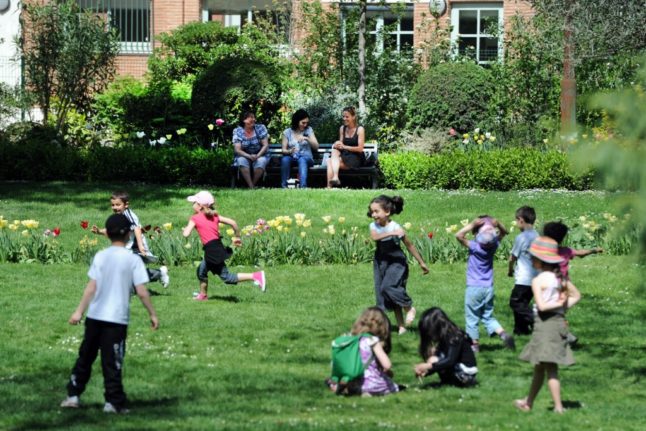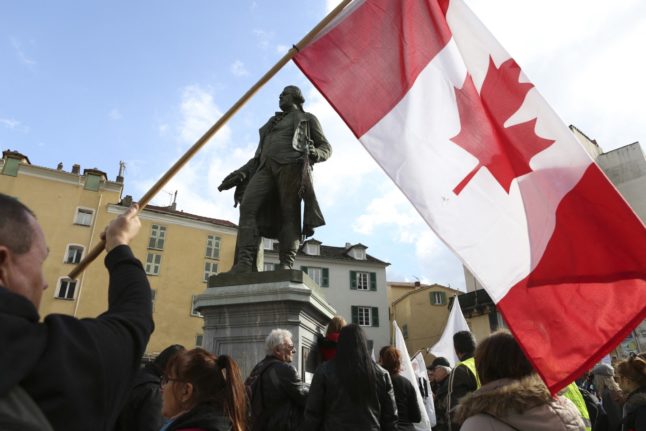I have often read descriptions of new arrivals in France struggling to break down the reserve of chilly French neighbours and colleagues or finding the parents at their children’s schools snobbish and even hostile. Perhaps I have just been very lucky, but this hasn’t been my experience at all.
There are plenty of opportunities to connect and make friends – both for you and for your children – but when you’re newly arrived it can be hard to know where to start.
The Baby Days
The early weeks and months of a new baby can be brutal, and having good friends around can make all the difference. Maternity leave tends to be short in France and many mums are back at work after three months.
While employees can request a congé parental d’éducation to prolong that leave, and more and more employers are wising up to the fact that dads can look after babies too and allowing for leave to be split, a short congé followed by crèche (the holy grail) or assistante maternelle for the baby remains the norm.
Pregnancy to maternity leave: What you need to know if you’re having a baby in France
Possibly for this reason, parent-and-baby activities can seem rather lacking here. When I had my first child in London we were spoiled for choice: baby cinema, baby music, baby sensory, baby gym plus regular meet-ups with fellow new mums and their babies to drink coffee and stare into space.
In Paris, with my second daughter, I found much less in the way of entertainment for parents with new babies in tow (because let’s face it, the whole point is to occupy the parents) but these activities do exist, you just have to seek them out.
Look out for posters for baby yoga, baby music and the like. The babies might only be interested in chewing the flyers but the classes can be great ways to meet parents of similar-aged children.
Facebook still has its uses – check out local parents’ groups for your area. These can be a hive of useful information, with everything from paediatrician recommendations to offers to sell and swap baby clothes and equipment.
I’ve also made good friends by replying to meet-up requests from fellow English-speaking mums. When you’re sleep- deprived, sometimes it’s nice to be able to chat easily in your mother tongue.
The childcare setup you choose might be one way to forge new connections in France: while you’re unlikely to cross paths much with fellow parents dropping off or picking up at the crèche, for a garde partagée – one nanny shared between two families – you’ll need to find a co-family you get on with and with any luck your children will become friends.
One alternative to the standard crèche municipale (where spaces are rarer than unicorns anyway) is the crèche parentale, run by an association of parents – here you would have no choice but to get involved alongside the other parents.
READ ALSO How does the cost of childcare compare in France?
Looking beyond formal weekday childcare, lieux d’accueil are, as the name suggests, welcoming spaces with toys and room to play, where staff (often volunteers) are there to lend an ear if needed.
My daughter met her best friend at our local one when they were just 18 months old, six years later the friendship – extended to the whole families – is still going strong.
In the same vein, ludothèques are public spaces where kids can play with or sometimes borrow toys. In the summer months ludothèques and libraries sometimes set up outdoor reading or play spaces in parks. Some crèches and school playgrounds open at weekends for play sessions with children and their parents or carers.
Look out too for posters by associations (charities) in your local area advertising events for families: these can be themed around certain activities or just casual meet-ups sometimes known as a café des parents – all good places to meet local families, exchange local tips and maybe strike up a friendship.
But if you’re struggling to the point that a cheer-up-coffee-and-cake won’t help, there are plenty of organisations that can provide more targeted support, whether that’s with practicalities such as breastfeeding or just for company and advice.
You may be familiar with your local Protection Maternelle et Infantile (PMI) from taking your baby to be weighed, but these organisations offer much more besides, with a team made up of childcare experts, doctors and nurses that can help with health checks, monitoring your baby’s development and providing advice and support, both practical and moral. They also put on support groups for future and new parents as well as baby massage classes.
Family-centred society: What it’s really like raising kids in France
Park Life
Once your children are a little older, and especially if you live in a city, you’ll certainly spend more time in the playground than you ever thought possible.
French parents are usually pretty hands-off with their charges, letting them get on with eating sand or climbing the wrong way up the slide while they watch from afar.
Don’t be afraid to get chatting to your bench neighbour – we’ve made several good friends this way over the years, with the parents getting on as well as the kids.
For rainy days, see if there are any kids’ cafés near you – indoor space where children can run wild and parents can access caffeine.
Extracurricular Activities
Whether your child chooses football, scouts, fencing or dance, extracurricular activities are often run by associations so there will often be chances for parents to get involved in the organisation, a great way to meet other parents and volunteers.
If you’re on the lookout for English-speaking activities, you’ll find plenty (particularly in and around Paris) from musical theatre to Brownies. Don’t forget activities for yourself as well – once you have a babysitting option in place (see below) you’ll be free to meet people who share your love of archery or woodwork.
If you’re in search of ideas, in early September (la rentrée) be sure to attend your local Forum des Associations, where sports, arts and anything-you-can-think-of clubs and societies gather to set out what they offer.
Birthday Parties
Once your child or children are a bit older, birthdays are a good way to get to expand your local social circle.
Forget the organised fun of British kids’ parties, French parties are Lord of the Flies with Haribo.
No need for a lovingly prepared, balanced birthday tea, the menu is bonbons, bonbons, more bonbons and cake. And they probably won’t eat the cake.
In my experience French children do enjoy classic British party games such as pass the parcel and pin the tail on the donkey but they don’t really expect this kind of organised activity or entertainment, they just want to crash around with their friends.
Above the age of about three, most parents are delighted to leave their little darlings in the care of the birthday child’s parents, so the social part for the adults comes at the end, when they will most likely be happy to stay for a drink at pick-up time. The host parents will certainly need one.
School Gates
If you already have children when you move to France, slotting into the school system might seem an intimidating prospect. But your children will make friends quickly (even if they also have to learn French at the same time) and their friendships might also help you widen your social circle, although it will probably take time.
Depending on how many children you have and whether their school does everything from maternelle to lycée or not, you might be crossing paths with other parents at your child’s school for 15 years or more – so you may as well be on friendly terms.
As anywhere, the morning school run is usually a fraught experience, and since Covid, many schools have kept their staggered drop-off times for different classes, making it more of a drop-and-run than a chance for a relaxed chat. In the afternoon, some kids will be picked up by babysitters and others will stay at afterschool club, again, making it unlikely you’ll see the same parents day in day out.
But a friendly bonjour goes a long way and you’ll gradually get chatting to the parents of your child’s classmates at school fairs, parents’ meetings and birthday parties.
If your schedule allows, volunteering to accompany school trips can be a good way to get to know your child’s friends, teacher and the other parent volunteers. You can bond over the stress of trying to prevent 20-odd tiny terrors from launching themselves into the traffic or getting lost on the Metro.
You could also try volunteering for your school’s Association de parents d’élèves – chipping in to help organise the summer fair or Christmas market will be a great way to make friends with other parents.
Babysitters
Even when you’re in the thick of it, maintaining your links with the wide world beyond child-rearing is vital, so getting set up with a babysitter you trust is a good move.
You can go with one of many nanny/babysitting agencies such as www.kinougarde.com or www.babychou.com or if you want a personal recommendation ask around other parents at the crèche or school or check out requests on your local online parents’ group (see above).
Our school parents’ association helpfully provides a list of older children looking for babysitting jobs. Yours might too.
Once you have a trusted babysitter in place the world’s your oyster – join a local club or activity or take up a new sport and you’re bound to make like-minded friends.
Expat Associations
Sticking entirely to an expat bubble won’t help you integrate with your new French neighbours in the long-run, but groups aimed at English speakers can be a godsend, especially when you’re newly arrived or when your children are small and the navigating the unfamiliar in a foreign language is just too much.
In Paris, Message (www.messageparis.org) offers everything from antenatal classes to trick-or-treating events for older kids alongside plenty of practical support and tips on how to navigate life and parenting in France for new mums and dads as well as parents of older kids. Members are organised into local groups by arrondissement or suburb, meaning it’s easy to forge links close to home – I met one of my closest friends here that way.
Facebook can play a role here too, there are groups for English-speaking parents linked to specific areas and one in particular, Mums Space France, covers the whole country, offering advice, meet-ups and virtual camaraderie.
Helen Massy-Beresford is a journalist, editor and copywriter who has lived in France since 2016.



 Please whitelist us to continue reading.
Please whitelist us to continue reading.
Member comments